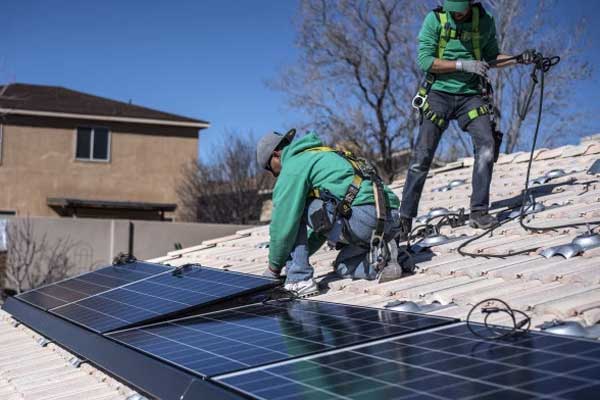- Bill aims to help low-income NJ families hit hardest by financial, health impacts of COVID-19.
- The bill is the first step in implementing the New Jersey Equitable and Resilient Solar + Storage Policy Roadmap.
- The goal of the bill is to use solar, storage, and energy efficiency to bring low-income households.
New Jersey — Justice, solar, and community advocates joined Senator Troy Singleton in introducing the NJ Clean Energy Equity Act, S. 2484, to help low-income New Jersey families benefit from solar, storage and energy efficiency.
The bill is the first step in implementing the New Jersey Equitable and Resilient Solar + Storage Policy Roadmap, which outlines how New Jersey can help 250,000 low-income families benefit from solar and energy efficiency and install 400 megawatts of storage by 2030.
Building energy resilience in low-income communities will help reduce the harm of future financial crises on our most vulnerable communities. While the moratorium on utility shut-offs is a positive step, investing in solar and storage will provide sustainable savings to low-income households and environmental justice communities, as well as local jobs and economic investment. As New Jersey begins to consider how to build back better, the Clean Energy Equity Act will provide the direction and tools to create a stronger, more resilient, and sustainable post-COVID New Jersey.
“New Jersey’s low-income families and environmental justice communities have the most to gain from clean energy savings, new local jobs and reduced fossil fuel pollution, particularly given the health and financial devastation of COVID-19,” said Pari Kasotia, Mid-Atlantic Director for Vote Solar. “But existing policies fall short of ensuring that all of clean energy’s many benefits reach every New Jerseyan. NJ Clean Energy Equity Act fills a policy void that can make a difference in the everyday lives of New Jersey families month after month.”
The goal of the bill is to use solar, storage, and energy efficiency to bring low-income households and environmental justice communities within or below the average energy burden for the state. Energy burden is the percentage of gross household income spent on energy costs, which is disproportionately high for low-income families.
“All New Jerseyans –regardless of their zip code or socio-economic status — must have access to the many economic and environmental benefits that solar energy can provide,” said Senator Troy Singleton, bill sponsor. “Our proposal establishing the Office of Clean Energy Equity will ensure that clean energy reaches every corner of our state, especially those communities that have been traditionally underserved.”
To do this, the bill instructs the Department of Labor to provide grants and additional programs to develop solar and clean energy curriculum, and paid workforce training programs that provide solar training to at least 2,500 individuals from overburdened communities by 2025. The bill will also require that all new construction in low-income and environmental justice communities be solar-ready, reducing future costs for families and businesses that choose to go solar.
“Making solar more available to low income, urban communities is an environmental justice issue. Newark residents are on the front lines of two crises, breathing dirtier air that Harvard research shows makes COVID-19 more deadly and what 11,000 leading scientists call the climate emergency,” said Clean Water Action environmental justice organizer Kim Gaddy, a Newark resident with three asthmatic children. “This bill will create good jobs for local residents and reduce our carbon footprint, the heat island effect, and the number of children, elderly, and others most vulnerable gasping for air from an asthma attack, running to the ER, missing school and work, and suffering premature death disproportionately in urban, low income and people of color communities.”
The bill was referred to the Senate Environment and Energy Committee. The first hearing on the bill is not yet scheduled.















Comments